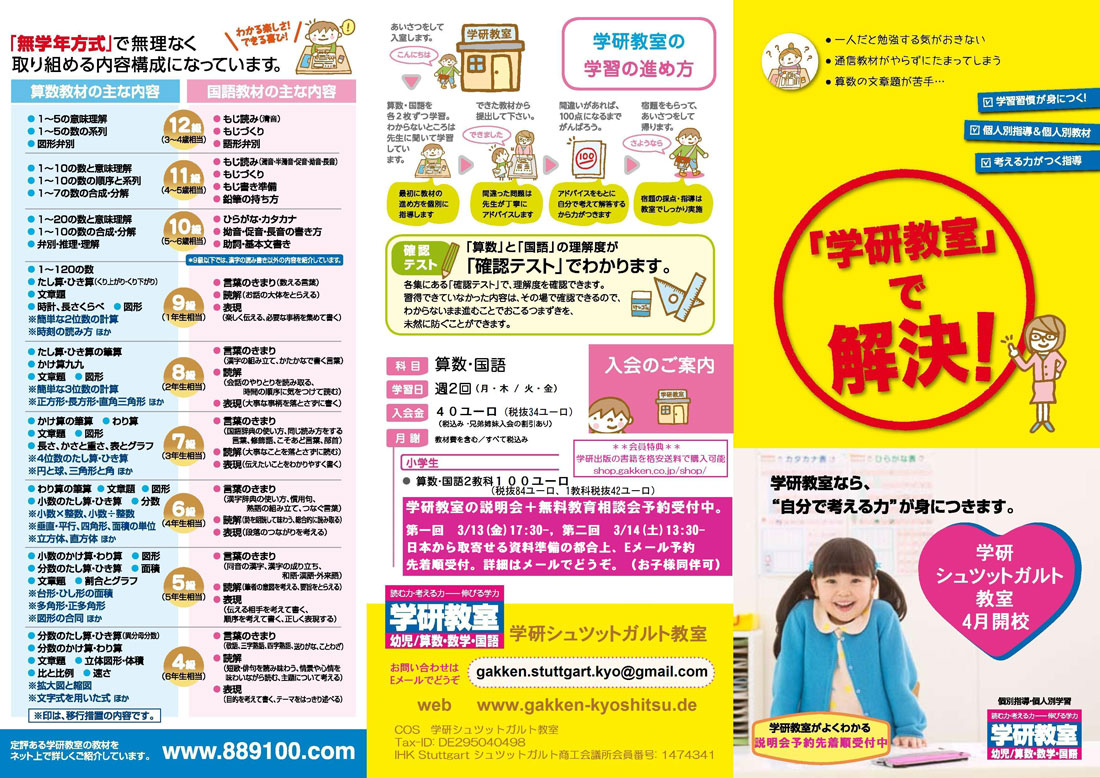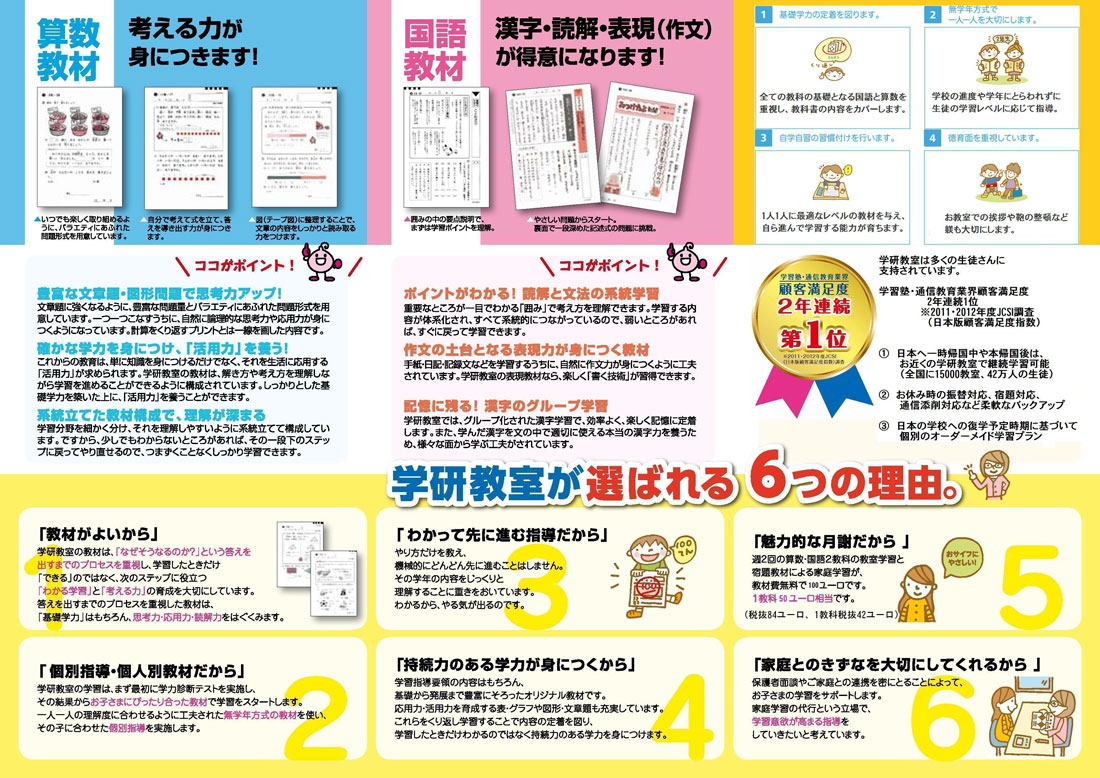GAKKEN school for Japanese children
Part of the COS Services portfolio is the Japanese Kyoshitsu School Gakken in Stuttgart.
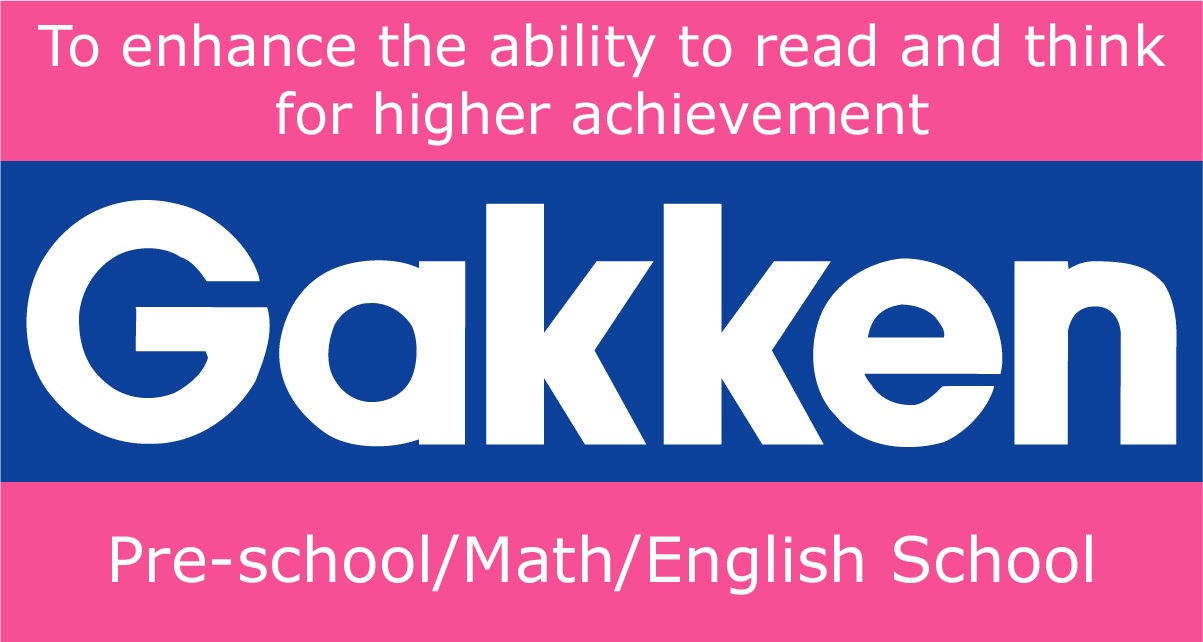
What's Gakken Kyoshitsu School?
Gakken Kyoshitsu school is a complementary Japanese school taking place, after the actual, normal school lessons, in the afternoon or evening. It complements the subject matter of the normal school. This type of school is quite normal in Japan. Almost every student visits this kind of school, a so called Juku. "Kyoshitsu" means class-room and "Gakken" is the publishing company that produces the learning materials.
Why attend Gakken Kyoshitsu?
Basically it encourages autonomous and independent learning using riddles. The students apply the knowledge from school to solve problems. This helps the students advance their expertise in arriving at solutions to problems and to grow faster. A Japanese Juku also prepares the students for the very difficult Senior High School and University entrance exams.
What’s the difference between Gakken Kyoshitsu and normal schoolwork?
Each exercise consists of different tasks and riddles, with a strong practical relevance. This helps the students to understand which problems can be solved with the methods they learned in school. In the classroom students with different age and educational levels are together, but each student learns individually. There is no teacher at the front and no blackboard. If a child needs help he or she comes to one of the 2-3 teachers. Using questions to make the student reflect, the teacher gives hints that lead the student to a possible solution.
Which subjects are offered?
At Gakken Kyoshitsu Stuttgart we started with mathematics and Japanese. Since 2017 we also offer science, geography and more subjects taught in Japanese. Since 2018 we also offer English for Japanese children.
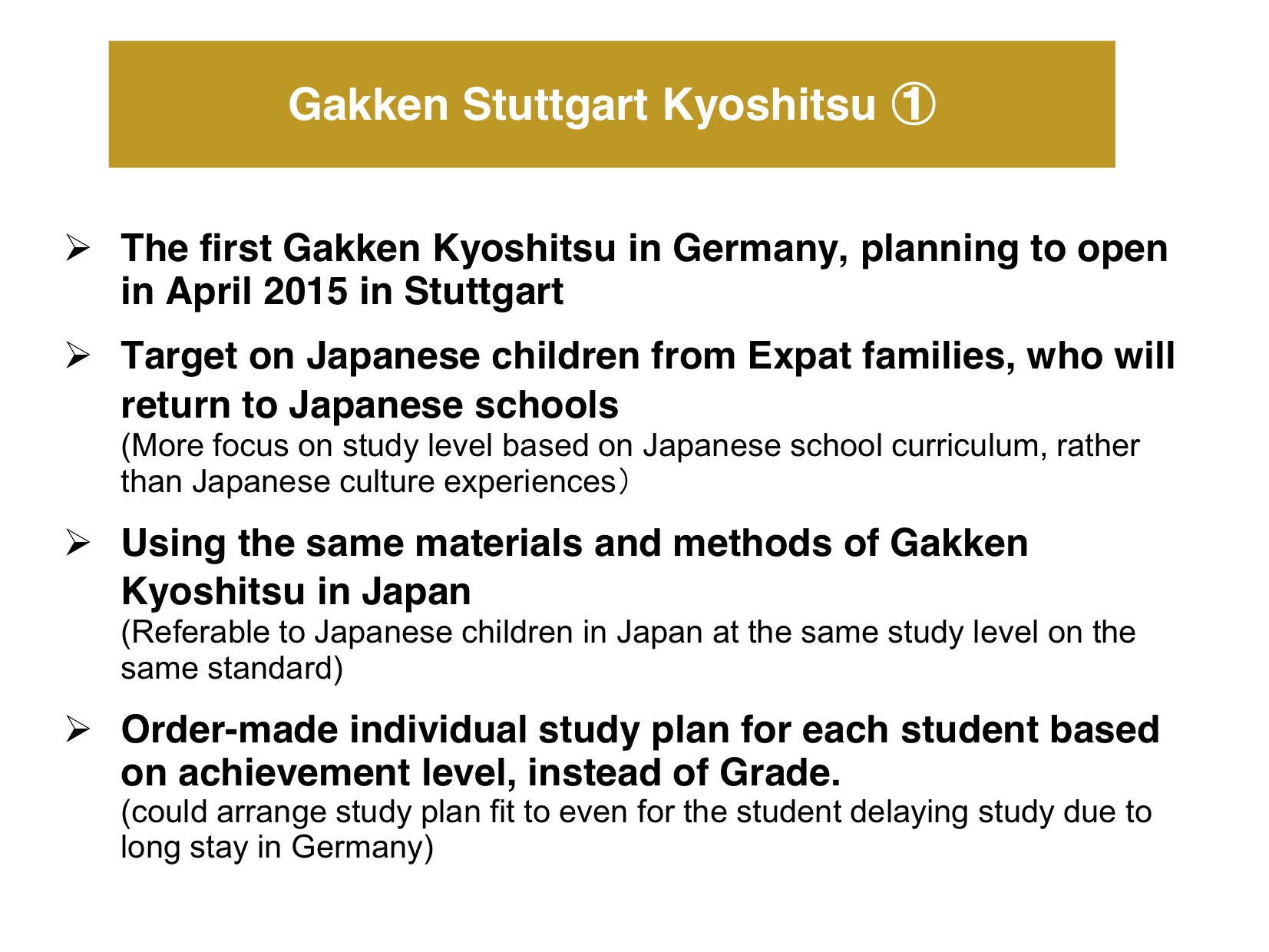
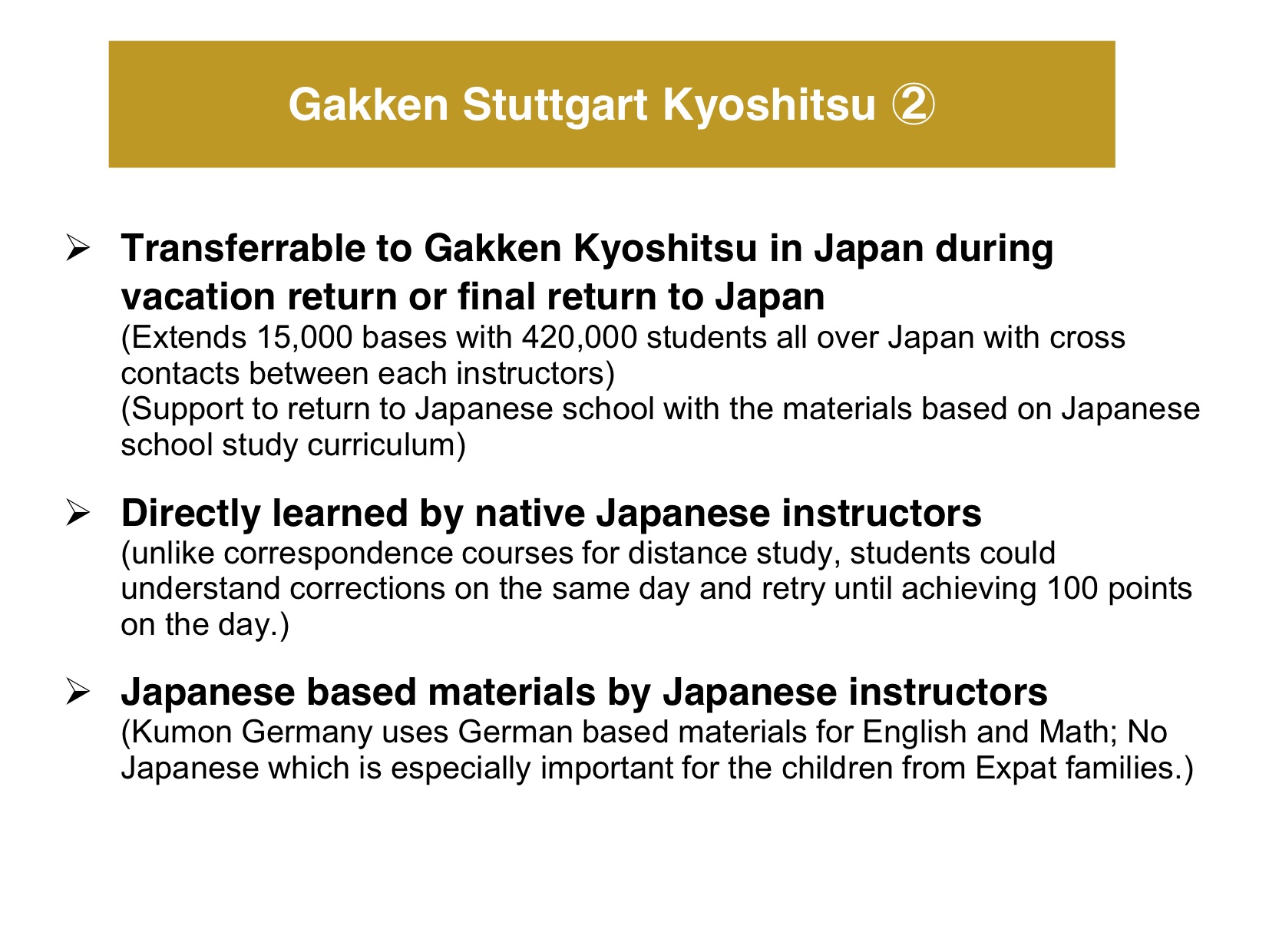
Why COS Services founded Stuttgart Gakken Kyoshitsu ?
Reintegration of the expatriate children after living abroad was the largest problem for our customers. If the children can not visit Japanese school during the expatriate assignment for e.g. 2-3 years, returning to Japanese school is extremely difficult. Before COS Services Stuttgart founded the school, many children were about 2-3 years behind the usual education level of their classmates in Japan.
What did expatriates do in Stuttgart did before Gakken Kyoshitsu was founded ?
Many Japanese employees with school age children decided against an expatriate assignment because of this. Others tried to teach their children the most important school subjects - mathematics and Japanese - by themselves. Indeed there is a Japanese Saturday school in Stuttgart, in which many teachers, mostly unsalaried, help the children. However the required age-appropriate level of education cannot be assured within the few lessons a week. In some cases an expatriate’s wife would remained with the children in Japan - separating the family.
What was the consequences?
Separation of the family is a stress factor on top of the already high load on an expatriate. Having his family nearby give the expatriate stability.
Trying to teach their children the necessary education, leads to frustration for both parents and children. For many Japanese expatriate families in Stuttgart the missing education of their children was really the biggest problem. Often this problem becomes obvious on the return of to Japanese school. At that point a large effort is required to make up for the deficit.
Why is this different for Japanese children, why this is so special?
To explain this, some background information is required. Japanese children are assigned a grade based only on age - not by the performance. If the necessary knowledge and skills are not achieved, it is not possible to repeat a class level!
There are competitive examinations to enter Senior High Schools. Students can only attend the Senior High Schools where they pass the entrance examination. This also applies for university application. Each Senior High School can decide the level of difficulty by themselves. The school grades of the students don’t matter, only the examination tests count.
This also explains why a person’s grades are not considered important in Japan, but rather the reputation of the school/university he or she attended.
If a student do not pass the entrance examination, of a famous and good school, he or she will attempt the entrance examination at a less famous school. If this test is failed, the student will apply for progressively easier schools.
So, the way of life is decided very early in Japan. Therefore it is obvious why an age-appropriate level of education is absolutely required.
Why is reintegration of Japanese children such a big problem?
Japanese schools have a stronger focus on science and especially math. Japanese students are far ahead in mathematics compared with the students in other countries for example Germany. What German students learn a 6th grade mathematics class (age between 12-13), Japanese students will learn when they are 10 years old. The worldwide Pisa study shows this spectacular result: Japanese students are always No. 1 in mathematics, and since years!
Even the calculation methods students learn in Japan are totally different from those in Europe. Also it is an enormous hurdle for the expatriate children to learn the very complicated Kanji characters, that a Japanese student has to learn by the age of 18. Those who cannot read Kanji, are not capable of understanding newspapers or complex texts. Those who cannot correctly write Kanji, disqualifying themselves from many parts of society and the workforce.
Isn’t it too much for the children to go to Gakken Juku after school and learn again?
From western perpective, maybe. But from a Japanese perspective it is absolutely normal. In Japan it’s usual that students visit a Juku. There are many different Jukus. They are large franchises or publishing companies.
The very fact that one of the biggest Jukus “Gakken Kyoshitsu” is visited by 720.000 students in 15.000 schools in Japan shows that!
It is also a fact, that the children determine their learn speed by themselves. There is no pressure. Teachers correct students not by "right / wrong", but by tips and advices. The students have to find an approach to solve the riddles by themselves.
The students experience success, self-confidence understand how to apply the knowledge they learn in school.
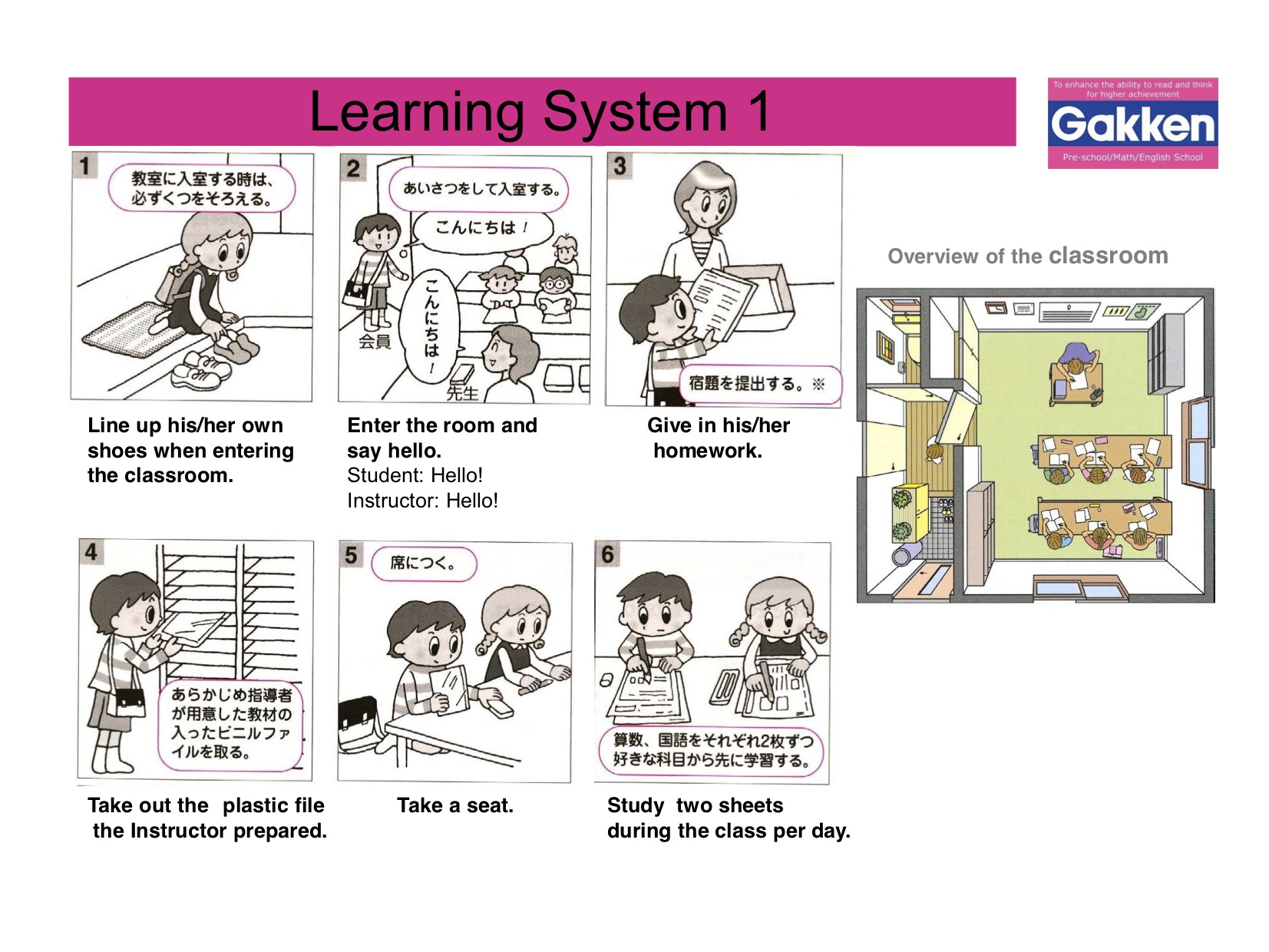
Will the exercises put additional pressure on the students to succeed?
Like in a computer or video game, you just can enter the next level, when all tasks and exercises have been completed correctly.
The exercises for each student are prepared individually. Each exercise is selected based on the current level of education an ability. So students are able to solve the exercise or riddles. It starts very easy. Step by Step it gets more challenging.
In this way, students experience a very strong self-motivated learning and tasks are more like a “challenge”. Because the exercises are completely individual, there is no chance for comparison between the students to each other. So there is no competitiveness between the students of Gakken Kyoshitsu.
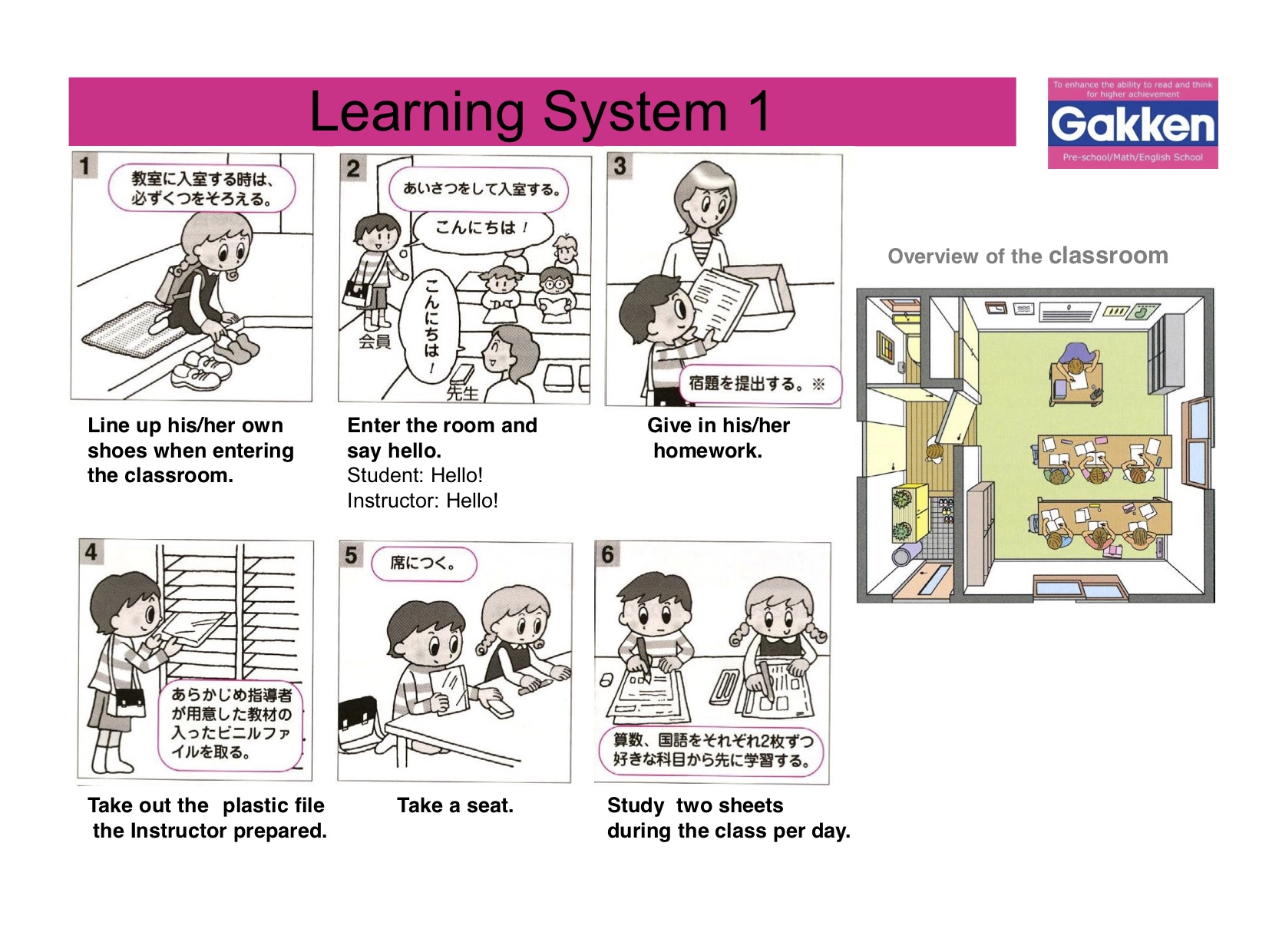
Where does the Stuttgart Gakken Kyoshitsu takes place?
COS Services Stuttgart rented class rooms in the Queen Charlotte High School in Stuttgart Möhringen. In 2017 we improved the convenience for our customers, by selecting a more central location.
Now Stuttgart Gakken Kyoshitsu is located in the International School Stuttgart Degerloch, which is where the most of our students attend school. This saves time and effort for our customers.
Is it possible non-Japanese children can join as well?
Gakken Kyoshitsu exercises are exclusively in Japanese language and specific to the Japanese curriculum, the lessons are in Japanese language by our Japanese qualified teachers.
How has the Stuttgart Gakken Kyoshitsu developed since its foundation ?
COS in Stuttgart founded the first “Gakken-Juku” in Germany and became the second Japanese Gakken Juku in Europe.
The Gakken Kyoshitsu supplements the Japanese Saturday School. Many teachers from Japanese Saturday School have even started working for Gakken Kyoshitsu Stuttgart because of the fantastic concept.
Of all the Gakken Jukus worldwide Stuttgart Gakken students had the strongest growth in number of students. Indeed the students of Stuttgart Gakken Kyoshitsu are now at least on the same level of education, compared to the students in Japan. A 2017 test in which all 15.000 Gakken Jukus participated, all (!) Stuttgart Gakken Kyoshitsu students got awards for very good performances!
More literature is here in English Language:
The Stuttgart Gakken Kyoshitsu Germany is here in Japanese language:
In following video the leader of "Gakken International", Hiromitsu Funami, who travelled to us in Stuttgart, came to present his enterprise in person for the opening of the second European Gakken Kyoshitsu.
{youtube}Vf8WDq73Yw0{/youtube}
